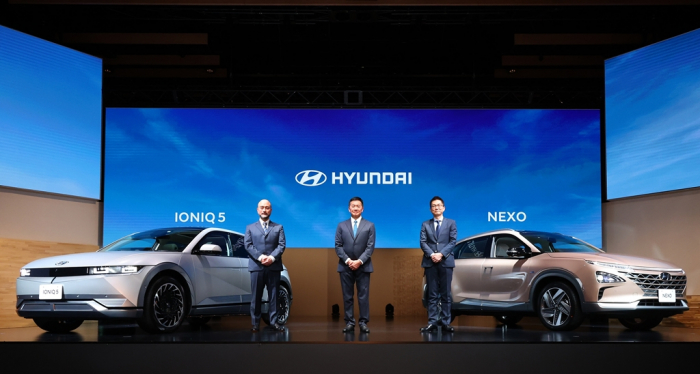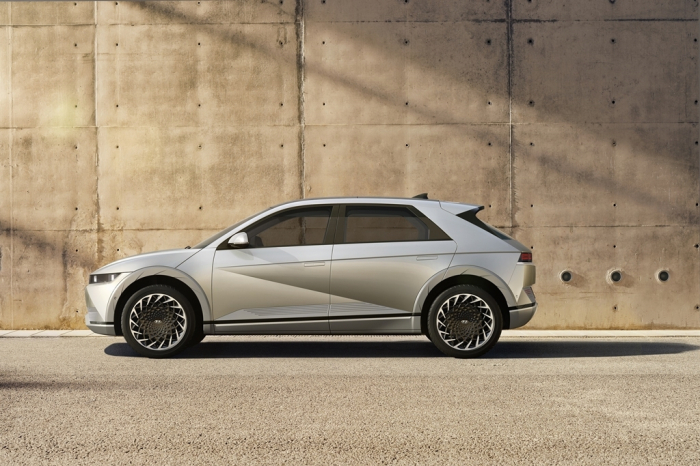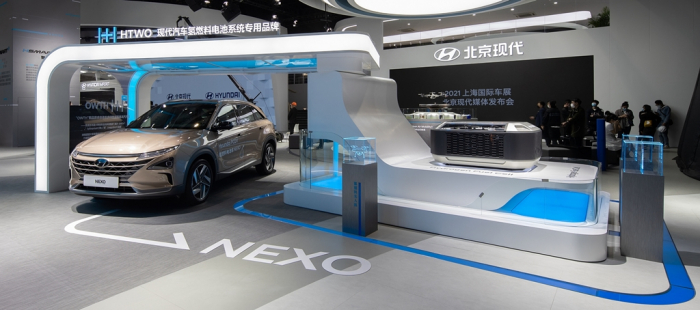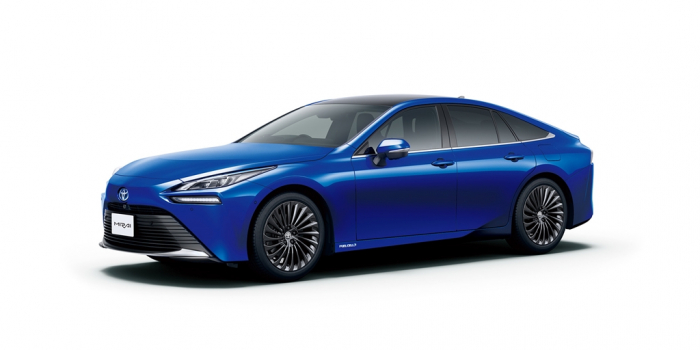Automobiles
Hyundai to take fresh crack at Japan market with online EV sales
CEO Chang says the company has “prepared a lot, not to repeat the same mistake”
By Feb 08, 2022 (Gmt+09:00)
3
Min read
Most Read
LG Chem to sell water filter business to Glenwood PE for $692 million


Kyobo Life poised to buy Japan’s SBI Group-owned savings bank


KT&G eyes overseas M&A after rejecting activist fund's offer


StockX in merger talks with Naver’s online reseller Kream


Mirae Asset to be named Korea Post’s core real estate fund operator



TOKYO – Hyundai Motor Co. is reentering the Japanese car market after a 12-year hiatus with its latest electric vehicles, as the growing demand for eco-friendly cars is offering a fresh opening in a market dominated by domestic brands such as Toyota Motor Corp.
The top South Korean automaker first entered Japan’s passenger car market in 2001 but left the neighboring country in 2009 after selling only 15,000 gasoline-powered cars, mostly the Sonata and Grandeur sedans.
“Japan is the market from which we have to learn and into which we have to explore. With our reentry into the market, we will offer our customers not just cars but also various mobility services,” said Hyundai Motor Chief Executive Chang Jae-hoon.
At a launch event held in Tokyo on Tuesday, Hyundai executives said the company will start with the IONIQ 5, a mid-size crossover EV, and the NEXO, a hydrogen fuel cell SUV, and expand its lineup later. The company has no plans to sell internal combustion engine cars in Japan.
Unlike its first bid to crack the Japanese market 12 years ago, Hyundai this time will sell its EVs exclusively through an online marketing platform to appeal to buyers increasingly accustomed to online shopping amid the pandemic.

However, the Korean carmaker said it will establish customer experience centers in Yokohama and other parts of the country to let customers test-drive Hyundai cars. It will also team up with Anyca, a Japanese car-sharing platform, to connect vehicle owners with prospective renters.
Hyundai said it will start receiving orders in May with an aim to deliver cars from July.
HIGHLY LOYAL TO DOMESTIC BRANDS
In Japan, Hyundai Motor will be selling its electric cars to customers, who are highly loyal to domestic brands.
Of some 5 million cars sold in Japan annually, around nine-tenths are Japanese brands, with Toyota holding about a 40% market share, according to industry data. Imported cars accounted for a mere 5.4% of all cars sold in Japan last year.
Booming demand for EVs, however, is providing foreign brands such as Hyundai and Tesla Inc. with a fresh chance, analysts said.

Hyundai’s IONIQ 5 will be competing with battery-based EVs being rolled out this year from Japan’s top two automakers – Toyota Motor’s bZ4X and Nissan Motor Co.’s Ariya.
To make the IONIQ 5 competitive against its Japanese rivals, Hyundai plans to set the price of the IONIQ 5 at between 4.79 million yen and 5.89 million yen ($41,555-$51,097), lower than the Nissan Ariya’s 5.4 million-7.4 million yen range. Toyota hasn’t indicated a price for the bz4X.
Hyundai’s NEXO SUV will be mainly competing against Toyota’s Mirai as Japan’s Honda Motor Co. said in June last year that it is exiting the hydrogen fuel cell electric vehicle (FCEV) market.
The Toyota Mirai sedan is the world’s first commercialized hydrogen fuel cell car launched in 2014, while the Hyundai NEXO is a crossover utility vehicle (CUV) based on the Korean automaker’s Tucson SUV platform.

According to market tracker SNE Research on Tuesday, Hyundai sold 9,300 NEXO cars globally in 2021, accounting for 53.5% of the FCEV market. Toyota sold 5,900 Mirai sedans, accounting for 34.2% of the market.
Hyundai’s NEXO, first launched in 2018, has been leading the global fuel cell EV market for three consecutive years since 2019.
Analysts said they didn’t expect Hyundai’s EV sales in Japan to rise significantly in the near future, given Japan’s slower EV uptake than other markets such as the US and Europe.
In a recent interview with Bloomberg, Hyundai Motor CEO Chang said: “We have prepared a lot, not to repeat the same mistake.”
Write to Byung-Uk Do and Yeong-Hyo Jeong at dodo@hankyung.com
In-Soo Nam edited this article.
More to Read
-
 Future mobilityHyundai to run IONIQ 5 self-driving robotaxi pilot service in H1, 2022
Future mobilityHyundai to run IONIQ 5 self-driving robotaxi pilot service in H1, 2022Nov 25, 2021 (Gmt+09:00)
3 Min read -

-
 AutomobilesHyundai NEXO, Toyota Mirai to compete in fuel cell cars as Honda exits
AutomobilesHyundai NEXO, Toyota Mirai to compete in fuel cell cars as Honda exitsJun 18, 2021 (Gmt+09:00)
2 Min read
Comment 0
LOG IN


